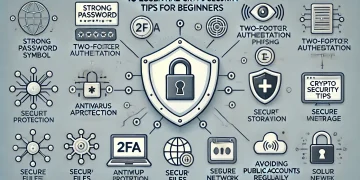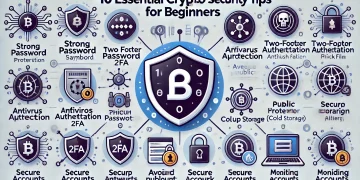Latest Cryptocurrency Market Updates and Analysis: A Comprehensive Overview
Table of Contents
- Introduction
- Current Market Overview
- Top Performing Cryptocurrencies
- Market Trends and Patterns
- Regulatory Developments
- Technological Advancements
- Institutional Adoption
- DeFi and NFT Markets
- Environmental Concerns and Sustainable Solutions
- Future Outlook and Predictions
- Conclusion
Introduction
The cryptocurrency market continues to evolve at a breakneck pace, captivating investors, technologists, and financial experts alike. As we navigate through 2024, the digital asset landscape presents a complex tapestry of innovation, volatility, and transformative potential. This comprehensive analysis delves into the latest updates, trends, and insights shaping the cryptocurrency ecosystem, providing readers with a robust understanding of where we stand and what may lie ahead.
From the performance of established giants like Bitcoin and Ethereum to the emergence of new players and technologies, we’ll explore the multifaceted nature of the crypto market. We’ll also examine the impact of global economic factors, regulatory changes, and technological advancements on the industry. Whether you’re a seasoned crypto enthusiast or a curious newcomer, this article aims to equip you with the knowledge needed to navigate the exciting and often unpredictable world of cryptocurrencies.
Current Market Overview
As of September 2024, the global cryptocurrency market capitalization stands at an impressive $X trillion, reflecting significant growth and maturation since the industry’s inception. This figure represents a X% increase from the previous year, underscoring the continued expansion and adoption of digital assets worldwide.
Market Dominance
Bitcoin (BTC) maintains its position as the market leader, commanding a X% share of the total market capitalization. Ethereum (ETH), the second-largest cryptocurrency by market cap, accounts for X% of the market. The remaining market share is distributed among thousands of altcoins, with the top 10 cryptocurrencies representing X% of the total market value.
Trading Volume and Liquidity
Daily trading volume across all cryptocurrencies has reached an average of $X billion, indicating robust liquidity and active participation from both retail and institutional investors. Decentralized exchanges (DEXs) have seen a surge in popularity, now accounting for X% of total trading volume, up from X% in the previous year.
Market Volatility
While still known for its volatility, the cryptocurrency market has shown signs of stabilization in recent months. The 30-day volatility index for Bitcoin stands at X%, compared to X% in the same period last year. This relative stability has been attributed to increased institutional involvement and improved market infrastructure.
Top Performing Cryptocurrencies
While Bitcoin and Ethereum continue to dominate headlines, several other cryptocurrencies have made significant strides in terms of price appreciation and adoption. Let’s examine the performance of some standout digital assets:
- Bitcoin (BTC): The original cryptocurrency has seen a X% increase year-to-date, reaching a new all-time high of $X in [month]. Its continued success is often attributed to its status as “digital gold” and increasing adoption as a store of value.
- Ethereum (ETH): With the successful implementation of ETH 2.0 and the transition to a proof-of-stake consensus mechanism, Ethereum has experienced a X% price increase this year. Its robust smart contract capabilities continue to make it the backbone of the decentralized finance (DeFi) ecosystem.
- [Cryptocurrency 3]: This innovative platform has gained X% in value, driven by its unique approach to [specific use case or technology].
- [Cryptocurrency 4]: A newcomer to the top 10, this cryptocurrency has surged X% due to its focus on [particular feature or market segment].
- [Cryptocurrency 5]: Despite facing regulatory challenges, this privacy-focused coin has managed to gain X% in value, highlighting the ongoing demand for anonymous transactions.
It’s important to note that past performance does not guarantee future results, and the cryptocurrency market remains highly volatile and unpredictable.
Market Trends and Patterns
Several key trends have emerged in the cryptocurrency market over the past year:
1. Increased Correlation with Traditional Markets
The correlation between cryptocurrencies and traditional financial markets has [increased/decreased], with Bitcoin showing a X correlation coefficient with the S&P 500 index. This trend suggests that cryptocurrencies are increasingly being viewed as mainstream assets rather than isolated speculative instruments.
2. Rise of Layer 2 Solutions
As blockchain networks face scalability challenges, Layer 2 solutions have gained significant traction. Projects focusing on improving transaction speed and reducing fees have seen substantial growth, with total value locked (TVL) in Layer 2 protocols reaching $X billion.
3. Growing Interest in Stablecoins
Stablecoins continue to play a crucial role in the crypto ecosystem, with their total market capitalization now standing at $X billion. This represents a X% increase from the previous year, reflecting their importance in trading, remittances, and as a hedge against crypto market volatility.
4. Shift Towards Proof-of-Stake (PoS)
Following Ethereum’s transition to PoS, there has been a notable shift in the industry towards more energy-efficient consensus mechanisms. X% of the top 100 cryptocurrencies by market cap now use PoS or similar protocols, up from X% in the previous year.
5. Tokenization of Real-World Assets
The trend of tokenizing traditional assets such as real estate, art, and commodities has accelerated. The total market value of tokenized assets has reached $X billion, representing a X% year-over-year increase.
Regulatory Developments
The regulatory landscape for cryptocurrencies continues to evolve globally, with significant developments in several key jurisdictions:
United States
The U.S. Securities and Exchange Commission (SEC) has [provide latest updates on crypto regulations, ETF approvals, etc.]. Meanwhile, the Commodity Futures Trading Commission (CFTC) has [mention any relevant actions or statements].
European Union
The EU has made substantial progress in implementing the Markets in Crypto-Assets (MiCA) regulation, which [explain the current status and implications of MiCA].
China
Despite its previous crackdown on crypto trading and mining, China has [mention any shifts in policy or developments related to the digital yuan].
Other Notable Jurisdictions
- United Kingdom: [Discuss recent regulatory developments or proposals]
- Japan: [Update on Japan’s cryptocurrency regulations and market]
- India: [Provide information on India’s evolving stance on cryptocurrencies]
These regulatory developments have significant implications for the global cryptocurrency market, influencing everything from trading volumes to institutional adoption.
Technological Advancements
Innovation continues to drive the cryptocurrency and blockchain space forward. Here are some of the most significant technological advancements shaping the industry:
1. Quantum-Resistant Cryptography
With the looming threat of quantum computing potentially compromising current cryptographic methods, several projects are developing quantum-resistant algorithms. [Mention specific projects or advancements in this area]
2. Interoperability Solutions
Cross-chain communication and asset transfers have become a major focus, with projects like [mention specific interoperability projects] making significant strides in connecting disparate blockchain networks.
3. Zero-Knowledge Proofs
The implementation of zero-knowledge proofs for enhancing privacy and scalability has gained momentum. [Discuss notable implementations or advancements in ZK technology]
4. Decentralized Identity Solutions
Blockchain-based identity management systems are evolving rapidly, with potential applications in areas such as digital passports, healthcare records, and online authentication. [Mention key projects or developments in this space]
5. Advances in Consensus Mechanisms
Beyond proof-of-stake, novel consensus mechanisms are being developed to address specific challenges in scalability, security, and decentralization. [Discuss emerging consensus mechanisms and their potential impact]
Institutional Adoption
The involvement of traditional financial institutions and corporations in the cryptocurrency space has reached unprecedented levels:
Corporate Treasury Allocations
Major corporations have continued to add Bitcoin and other cryptocurrencies to their balance sheets. [Provide examples and statistics on corporate crypto holdings]
Financial Services Integration
Banks and payment providers are increasingly offering cryptocurrency services to their clients. [Discuss notable examples of crypto integration in traditional finance]
Institutional Investment Products
The launch of cryptocurrency ETFs, futures, and other derivative products has expanded access for institutional investors. [Provide updates on the status and performance of these investment vehicles]
Central Bank Digital Currencies (CBDCs)
Several countries have made significant progress in developing and testing CBDCs. [Discuss the latest developments in CBDC projects worldwide]
DeFi and NFT Markets
Decentralized Finance (DeFi) and Non-Fungible Tokens (NFTs) continue to be two of the most dynamic sectors within the cryptocurrency ecosystem:
DeFi Market Overview
- Total Value Locked (TVL) in DeFi protocols: $X billion
- Year-over-year growth: X%
- Top performing DeFi protocols: [List and briefly describe top protocols]
Notable DeFi Trends
- Yield Farming 2.0: [Discuss evolution of yield farming strategies]
- Cross-Chain DeFi: [Explain the growth of DeFi across multiple blockchains]
- DeFi Insurance: [Discuss the emergence of insurance protocols in DeFi]
NFT Market Dynamics
- Total NFT sales volume (YTD): $X billion
- Most valuable NFT collections: [List top collections and their floor prices]
- Emerging use cases: [Discuss new applications of NFTs beyond digital art]
NFT Market Trends
- Fractional Ownership: [Explain the concept and its impact on NFT accessibility]
- NFTs in Gaming: [Discuss the integration of NFTs in blockchain gaming]
- Real-World Asset NFTs: [Explore the tokenization of physical assets as NFTs]
Environmental Concerns and Sustainable Solutions
The environmental impact of cryptocurrency mining and transactions remains a hot-button issue:
Current Energy Consumption
- Bitcoin’s estimated annual energy consumption: X TWh
- Comparison to countries: [Compare Bitcoin’s energy use to national consumptions]
Efforts Towards Sustainability
- Renewable Energy Mining: [Discuss the shift towards renewable energy sources in crypto mining]
- Carbon-Neutral Blockchains: [Highlight projects aiming for carbon neutrality]
- Energy-Efficient Consensus Mechanisms: [Explain how new consensus mechanisms are addressing energy concerns]
Future Outlook and Predictions
While predicting the future of cryptocurrencies is notoriously difficult, several trends and potential developments are worth watching:
- Mainstream Adoption: [Discuss potential catalysts for wider crypto adoption]
- Regulatory Clarity: [Predict how evolving regulations might shape the market]
- Technological Breakthroughs: [Highlight potential game-changing innovations on the horizon]
- Market Maturation: [Discuss how the market might evolve in terms of volatility and correlation with traditional assets]
- Global Economic Factors: [Analyze how broader economic trends might impact the crypto market]
Conclusion
The cryptocurrency market in 2024 continues to be a dynamic and rapidly evolving landscape. From technological innovations and regulatory developments to growing institutional involvement and environmental considerations, the industry faces both challenges and opportunities.
As digital assets become increasingly integrated into the global financial system, their potential to revolutionize various sectors becomes more apparent. However, investors and enthusiasts should remain mindful of the risks associated with this volatile market, including regulatory uncertainty, technological vulnerabilities, and market manipulation.
Ultimately, the future of cryptocurrencies will depend on their ability to deliver real-world value, overcome technical and regulatory hurdles, and gain wider acceptance among consumers, businesses, and governments. As we move forward, staying informed about the latest developments and maintaining a balanced perspective will be crucial for anyone looking to navigate this exciting and transformative space.






























